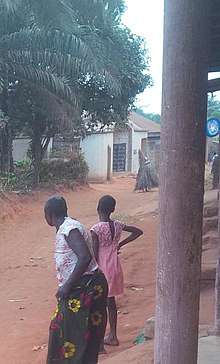Ngwo
Ngwo is a town located in the south-eastern state of Enugu, Nigeria, with a population of about 50,000 people. The towns native population are of Igbo ethnicity.
History

Ngwo people descended from the man called Ngwu-Ako who lived at a place now called "Isi Okpoto" the present day St. Mary Catholic Church and its environs with his wife. Ngwu-Ako gave it the name "Okpotokpo" literally in English (large) because the fruits and trees that grew there were of very large sizes and shapes. That is, for him, they were "okpotokpo" (very large/huge). Living there with his wife, they begot their ten (10) male children who eventually metamorphosed into the ten villages of Ngwo, namely: Uboji, Amankwo, Ameke, Ukaka, Enugu, Etiti, Amachala, Amaebo, Okwojo, and Umuase. While the first three (3) got settled at a place now called Ngwo-uno, the last seven (7) settled at a place also now called Ngwo-asaa. That accounts for the two (2) big shades/components of Ngwo, namely: (Ngwo-uno) and Ngwo-asaa (Ngwo-egu). While Ngwo-uno is made up of three main villages, namely: Amankwo, Ameke, and Uboji, Ngwo-asaa is composed of seven villages, viz: Enugu, Etiti, Amachala, Ukaka, Amaebo, Okwojo, and Umuase.
Geography
Ngwo is the only town in Nigeria that is in three Local Government Areas. Those Local Government Areas include: Udi, Enugu North and Enugu South Local Government Areas. This has been so, either for political reasons or for Ngwo being critical, as a major landlord, to the commercial nerve centres of those Local Government Areas, namely: Ninth Mile Corner and Enugu township. Geographically, Ngwo is bounded to the north by Abor, to the south by Nsude, to the west by Eké, and to the east by Niké. Ngwo remains a historically important place in Enugu state. Ngwo is a hilly area, with much of the land area being up to 600 meters above sea level. The hills are moderately sloping and undulating.
Development is fast enveloping Ngwo town considering the high spate of commercial activities both at Enugu township and Ninth mile Corner, Ngwo.
Governance
The first "Okpoto" (High chief) of Ngwo was Chief Donald Nnadi Oji, brought in by British colonialism.The second "Okpoto" of Ngwo was Chief Josiah O. Agu. Ameke Ngwo is one of the ten formative villages of Ngwo, which, in 2001, was upgraded to the status of an Autonomous Community by the Enugu State Government which gave rise to the establishment of the position of the traditional ruler, called the Igwe.
Igwe Jerome Charles Okolo, ‘Ogwugwuebenebe XXI’, of Ameke Ngwo, became the first holder of this position having been unanimously elected by the entire community in October 2003. His coronation was one of those huge community-wide festivals, for which the Igbo people of Eastern Nigeria are renowned. The ever impressive Ijele Masquerade – the king of Igbo masquerades, a multi-storey towering ensemble of carvings, masks and fabrics - made one of its very rare outings to grace the occasion, which was held on the football grounds of the local community primary school. (The creation of the so-called autonomous communities is sowing the seeds of disunity within the greater Ngwo community; instead of just one 'Okpoto of Ngwo', we now have Igwe of Ameke, Igwe of Uboji, Igwe of Amankwo, Ama of Ime-Ama (Okwojo), and the Esa of Ngwo Asa, making a total number of 5 Igwes in Ngwo Clan. At this rate, we may end up with over ten (10) mushroom 'igwe's or petit chiefs - the end result will be the loss of the real meaning of any of these titles.
Uboji is the first son of Ngwo, and Amokwe is the first son of Uboji, Amokwe-uwani; the ehums; aborigines hold the owhor, the staff and give interpretation to tradition and traditional practices, the present traditional ruler of uboji, Igwe Engr Basil Chibunine Ugwuozor was chosen based on this progenital fact. On issues of controversies in Ngwo, such issues are resolved by reaching the Ndinka (council of elders) Amokwe-uwani. The immediate past owhor holder, was Pa Jacob Ani Mba, he died at the age of 106 years. A successor will be announced after one year of his death. Next to Pa Jacob Mba is Pa Michael Onyia followed by Elder Elias O Ugwuozor, who also is the first surviving son of late pa Mark Ugwuozor; one of the first people to embrace Christianity in Ngwo. Ngwo is a town and a clan